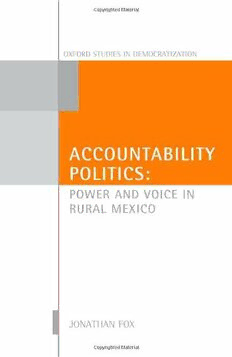
Accountability Politics: Power and Voice in Rural Mexico PDF
451 Pages·2008·2.208 MB·English
Most books are stored in the elastic cloud where traffic is expensive. For this reason, we have a limit on daily download.
Preview Accountability Politics: Power and Voice in Rural Mexico
Description:
How can the seeds of accountability ever grow in authoritarian environments? Embedding accountability into the state is an inherently uneven, partial and contested process. Campaigns for public accountability often win limited concessions at best, but they can leave cracks in the system that serve as handholds for subsequent efforts to open up the state to public scrutiny. This book explores the how civil society ''thickens'' by comparing two decades of rural citizens' struggles to hold the Mexican state accountable, exploring both change and continuity before, during, and after national electoral turning points. The book addresses how much power-sharing really happens in policy innovations that include participatory social and environmental councils, citizen oversight of elections, local government social investment funds, participation reforms in World Bank projects, community-managed food programs, as well as new social oversight and public information access reforms. Meanwhile, efforts to exercise voice unfold at the same time as rural citizens consider their exit options, as millions migrate to the US, where many have since come together in a new migrant civil society. Since explanations of electoral change do not account for how people actually experience the state, this book concludes that new analytical frameworks are needed to understand ''transitions to accountability.'' This involves unpacking the interaction between participation, transparency and accountability. Oxford Studies in Democratization is a series for scholars and students of comparative politics and related disciplines. Volumes concentrate on the comparative study of the democratization process that accompanied the decline and termination of the cold war. The geographical focus of the series is primarily Latin America, the Caribbean, Southern and Eastern Europe, and relevant experiences in Africa and Asia. The series editor is Laurence Whitehead, Official Fellow, Nuffield College, University of Oxford.
See more
The list of books you might like
Most books are stored in the elastic cloud where traffic is expensive. For this reason, we have a limit on daily download.
